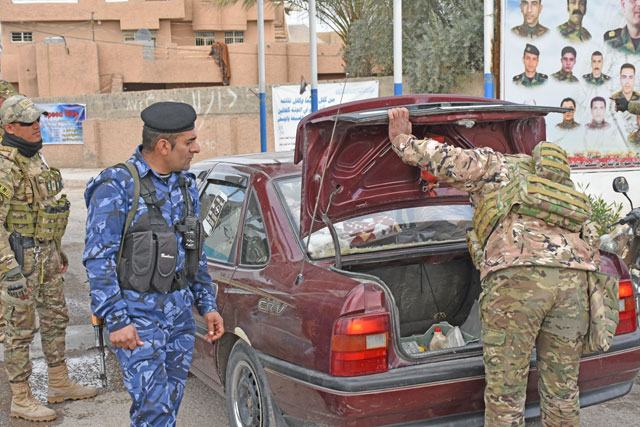MOSUL, Iraq — Barely a month after Baghdad declared victory over the Daesh terror group, the extremists could still recapture areas of Iraq, especially near the border with Syria, experts and officials say.
Ali Al Bayati, a commander of the Hashed Al Shaabi paramilitary units which fought alongside Iraqi security forces in a gruelling battle against the group, said the Nimrud area of northern Iraq could "fall at any time because security there is fragile".
Last July, the authorities in Baghdad announced with much fanfare the "liberation" of nearby Mosul, Iraq's second city and capital of Nineveh province.
Daesh fighters who fled their former stronghold and took refuge to the west, in the vast desert towards the Syrian border, have since launched attacks on security forces and civilians, Bayati said.
Hiding out in valleys and gullies as well as trenches dug before their ouster from Mosul, the extremists have built up stockpiles of arms, fuel, water and food and pose a persistent threat to populated districts along the Tigris valley, like the Nimrud area downstream from Mosul.
More than 4,000 extremists have been arrested in Nineveh province since Mosul’s capture, according to police chief General Wathiq Al Hamdani.
But Aed Al Louayzi of Nineveh provincial council said several civilians have been robbed or killed inside the city itself, some by assailants disguised as soldiers.
He said the attacks have been the work of Daesh members from the areas of Tal Afar and Hatra, both towns also recaptured last year from the extremists.
Hisham Al Hashemi, a specialist on extremist movements, said Iraq’s announcement in December of military victory “simply means that the [black] Daesh flag is no longer flying” over government buildings.
To counter the threat of a Daesh resurgence, “several operations have been carried out south of Mosul” with US-led coalition support to seize arms, said coalition spokesman Colonel Ryan Dillon.
Active not sleepers
Louayzi said that “geographically, the territory has been retaken... but not all the extremists there have been arrested”.
“We are in the same security situation as that which led to the fall of Mosul” back in 2014, which came after the extremists had seized control of some areas, he said.
To try to avoid past mistakes, Dillon said, “the coalition has trained Iraqi security forces to address the transition and future threats. We knew there would be a transition from fighting to policing”.
The Hashed, which is patrolling the border with war-torn Syria, says it faces infiltration attempts by extremists on a daily basis.
Although Daesh is also on the verge of overall military defeat in Syria, it surprised observers last week by announcing a comeback in the country’s northwest.
In the Hawija area of northern Iraq, at least three civilians and a Hashed fighter have been killed this month, according to security sources.
They said around 60 extremists have died in fighting around the town, one of the last Daesh urban strongholds retaken by Iraqi forces.
Iraq plans to hold parliamentary and provincial assembly elections on May 12 but they may yet be put off until the end of the year.
Large numbers of Sunni Arabs have yet to return to their homes in Nineveh and in Anbar province, west of Baghdad, after fleeing the fighting with Daesh.
Prime Minister Haider Al Abadi is seeking a new term at the head of a “Victory Alliance” while the Hashed are to stand separately on their own list as both seek to make political capital out of the military campaign.
On Monday, twin suicide bombings in Baghdad cost more than 30 lives, prompting Abadi to order security forces to “eliminate Daesh sleeper cells” and protect civilians.
But Hashemi said the threat is more immediate.
“This concept of sleeper cells is a mistake. They are not sleepers, they are active,” he said. “They are capable of mounting attacks and even of taking control of zones.”
